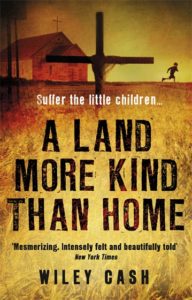Books
Dear Reader: a letter from Wiley Cash
Dear Reader,
Writers need to be surrounded by great stories, and it’s even better when they can be surrounded by great storytellers. My wife is a great storyteller.
According to her, when she was a little girl she was an incredibly talented baseball player, but she had only one weakness in her game: she didn’t know how to slide into base. To remedy this, after her father arrived home from work in the summertime, the two of them would walk to the baseball field behind the grade school she attended and they’d take turns sliding into third base, her father lending his encouragement and offering tips to help her feel more comfortable.
 Now, keep in mind that my wife is a great storyteller, so try to picture the image she painted for me: it’s dusk on a summer evening in the South; a father and his daughter are alone on an empty baseball field, taking turns sliding into base; the sound of crickets rises from the woods on the edge of the field; fireflies glow in the coming dusk; a car quietly passes on the road in front of the baseball field and slows down for a moment, taking in the scene. The car’s windows are down and you are inside it. You can hear the crickets, you can feel the warm, humid air, and when you look out toward the baseball field, what do you see?
Now, keep in mind that my wife is a great storyteller, so try to picture the image she painted for me: it’s dusk on a summer evening in the South; a father and his daughter are alone on an empty baseball field, taking turns sliding into base; the sound of crickets rises from the woods on the edge of the field; fireflies glow in the coming dusk; a car quietly passes on the road in front of the baseball field and slows down for a moment, taking in the scene. The car’s windows are down and you are inside it. You can hear the crickets, you can feel the warm, humid air, and when you look out toward the baseball field, what do you see?
In order to understand how powerfully this image struck me, you need to understand something about baseball and something about Americans. We call baseball “the boy’s game,” and we associate it with all the best things we want to see in ourselves as a people – innocence, purity, simplicity. That’s what I think of when I think of the image of my wife and her father out there on that field in the gathering dark.
That’s a wonderful story to hear, and I wanted to write about that girl and her father, but I knew it wouldn’t necessarily make for a great read. Readers like more complications, more drama, less innocence and purity and much less simplicity. I imagined that the little girl was out there playing ball with her friends that day after school, and when she slides into third base she stands up, dusts herself off, and spies her long-lost father sitting up in the stands, watching her. All she can think is What’s that loser doing here?
When it came to writing my second novel after the publication of A Land More Kind Than Home, I returned to that story my wife had told me. Once again, I conjured the image of the lost girl and her loser father, and then watched my own story spring up around the one I’d been told: two sisters are languishing in foster care after their mother’s death when their missing father returns and kidnaps them, desperately hoping for another chance at raising his family. But things can’t be that innocent or that pure or that simple. Hot on the father’s trail are two very different men – a violent bounty hunter with an old vendetta and an ex-cop who’s the girls’ court-appointed guardian.
But this girl who’s standing on third base doesn’t know any of what awaits her, and neither does the reader just yet. But both of them soon find out, and together they will learn that sometimes there is very little difference between the games of men and the games of boys, even though the games of men are much more dangerous.
Wiley Cash
Listen to Wiley Cash talking about This Dark Road to Mercy and read about the most difficult chapter in A Land More Kind Than Home.


Please note: Moderation is enabled and may delay your comment being posted. There is no need to resubmit your comment. By posting a comment you are agreeing to the website Terms of Use.